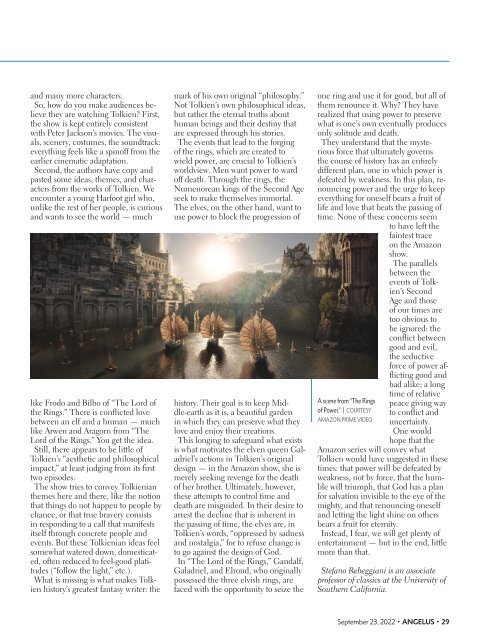Angelus News | September 23, 2022 | Vol. 7 No. 19
On the cover: The logo used for the Catechism of the Catholic Church, published in 1992, is adapted from an image found in the Catacombs of Domitilla in Rome thought to symbolize “the rest and the happiness that the soul of the departed finds in eternal life.” Ahead of the 30th anniversary of the catechism’s release next month, Russell Shaw explains on Page 10 what prompted the Church to undertake such an immense project. On Page 26, Greg Erlandson offers a perspective on the text’s relevance to ordinary Catholics — like his own mother.
On the cover: The logo used for the Catechism of the Catholic Church, published in 1992, is adapted from an image found in the Catacombs of Domitilla in Rome thought to symbolize “the rest and the happiness that the soul of the departed finds in eternal life.” Ahead of the 30th anniversary of the catechism’s release next month, Russell Shaw explains on Page 10 what prompted the Church to undertake such an immense project. On Page 26, Greg Erlandson offers a perspective on the text’s relevance to ordinary Catholics — like his own mother.
You also want an ePaper? Increase the reach of your titles
YUMPU automatically turns print PDFs into web optimized ePapers that Google loves.
and many more characters.<br />
So, how do you make audiences believe<br />
they are watching Tolkien? First,<br />
the show is kept entirely consistent<br />
with Peter Jackson’s movies. The visuals,<br />
scenery, costumes, the soundtrack:<br />
everything feels like a spinoff from the<br />
earlier cinematic adaptation.<br />
Second, the authors have copy and<br />
pasted some ideas, themes, and characters<br />
from the works of Tolkien. We<br />
encounter a young Harfoot girl who,<br />
unlike the rest of her people, is curious<br />
and wants to see the world — much<br />
like Frodo and Bilbo of “The Lord of<br />
the Rings.” There is conflicted love<br />
between an elf and a human — much<br />
like Arwen and Aragorn from “The<br />
Lord of the Rings.” You get the idea.<br />
Still, there appears to be little of<br />
Tolkien’s “aesthetic and philosophical<br />
impact,” at least judging from its first<br />
two episodes.<br />
The show tries to convey Tolkienian<br />
themes here and there, like the notion<br />
that things do not happen to people by<br />
chance, or that true bravery consists<br />
in responding to a call that manifests<br />
itself through concrete people and<br />
events. But these Tolkienian ideas feel<br />
somewhat watered down, domesticated,<br />
often reduced to feel-good platitudes<br />
(“follow the light,” etc.).<br />
What is missing is what makes Tolkien<br />
history’s greatest fantasy writer: the<br />
mark of his own original “philosophy.”<br />
<strong>No</strong>t Tolkien’s own philosophical ideas,<br />
but rather the eternal truths about<br />
human beings and their destiny that<br />
are expressed through his stories.<br />
The events that lead to the forging<br />
of the rings, which are created to<br />
wield power, are crucial to Tolkien’s<br />
worldview. Men want power to ward<br />
off death. Through the rings, the<br />
Numenorean kings of the Second Age<br />
seek to make themselves immortal.<br />
The elves, on the other hand, want to<br />
use power to block the progression of<br />
history. Their goal is to keep Middle-earth<br />
as it is, a beautiful garden<br />
in which they can preserve what they<br />
love and enjoy their creations.<br />
This longing to safeguard what exists<br />
is what motivates the elven queen Galadriel’s<br />
actions in Tolkien’s original<br />
design — in the Amazon show, she is<br />
merely seeking revenge for the death<br />
of her brother. Ultimately, however,<br />
these attempts to control time and<br />
death are misguided. In their desire to<br />
arrest the decline that is inherent in<br />
the passing of time, the elves are, in<br />
Tolkien’s words, “oppressed by sadness<br />
and nostalgia,” for to refuse change is<br />
to go against the design of God.<br />
In “The Lord of the Rings,” Gandalf,<br />
Galadriel, and Elrond, who originally<br />
possessed the three elvish rings, are<br />
faced with the opportunity to seize the<br />
one ring and use it for good, but all of<br />
them renounce it. Why? They have<br />
realized that using power to preserve<br />
what is one’s own eventually produces<br />
only solitude and death.<br />
They understand that the mysterious<br />
force that ultimately governs<br />
the course of history has an entirely<br />
different plan, one in which power is<br />
defeated by weakness. In this plan, renouncing<br />
power and the urge to keep<br />
everything for oneself bears a fruit of<br />
life and love that beats the passing of<br />
time. <strong>No</strong>ne of these concerns seem<br />
to have left the<br />
faintest trace<br />
on the Amazon<br />
show.<br />
The parallels<br />
between the<br />
events of Tolkien’s<br />
Second<br />
Age and those<br />
of our times are<br />
too obvious to<br />
be ignored: the<br />
conflict between<br />
good and evil,<br />
the seductive<br />
force of power afflicting<br />
good and<br />
bad alike; a long<br />
A scene from “The Rings<br />
of Power.” | COURTESY<br />
AMAZON PRIME VIDEO<br />
time of relative<br />
peace giving way<br />
to conflict and<br />
uncertainty.<br />
One would<br />
hope that the<br />
Amazon series will convey what<br />
Tolkien would have suggested in these<br />
times: that power will be defeated by<br />
weakness, not by force, that the humble<br />
will triumph, that God has a plan<br />
for salvation invisible to the eye of the<br />
mighty, and that renouncing oneself<br />
and letting the light shine on others<br />
bears a fruit for eternity.<br />
Instead, I fear, we will get plenty of<br />
entertainment — but in the end, little<br />
more than that.<br />
Stefano Rebeggiani is an associate<br />
professor of classics at the University of<br />
Southern California.<br />
<strong>September</strong> <strong>23</strong>, <strong>2022</strong> • ANGELUS • 29


















